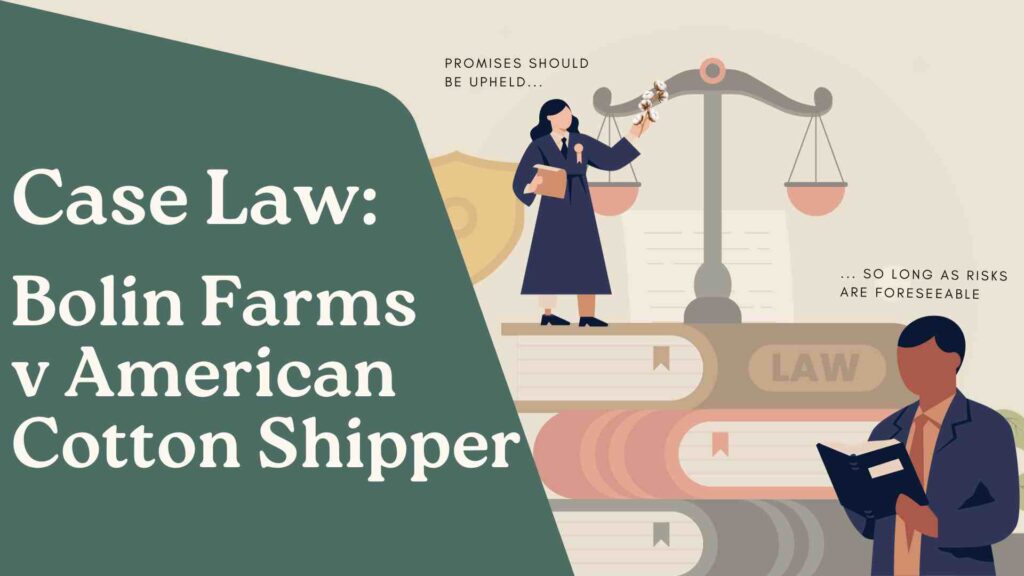
Bolin Farms v American Cotton Shipper is a contract law example that still holds relevance more than 50 years after the case. A lesson on honoring contracts amid changing circumstances, this contract law case brief serves as a reminder that promises with foreseeable risk, like price fluctuations, may be legally obligated to be upheld.
This article will share an overview of the case, including the court’s decision and reasoning, followed by key lessons to be learned from Bolin Farms v American Cotton Shipper.
Facts of the Case
Between January 9, 1973, and March 29, 1973, Bolin Farms (plaintiff) and 13 other cotton farmers engaged in forward sales agreements with American Cotton Shippers Association (American) (defendant). These agreements stipulated that American would purchase all future cotton produced by Bolin Farms on a designated acreage for an agreed-upon price. At the time of contract formation, cotton prices ranged from 29 to 41 cents per pound. However, by the time the cotton was ready for harvest in September 1973, market conditions and environmental factors had caused the price to soar to 80 cents per pound.
In response to this significant price increase, Bolin Farms filed a lawsuit in the United States district court. They sought a declaratory judgment asserting that the substantial price change subsequent to the contract’s inception rendered the agreement unenforceable. Prior to Bolin Farms’ lawsuit, thirteen similar cases were brought against American on the same basis, yet in all thirteen instances, the courts upheld the enforceability of the contracts.
Rule of Law
Once two competent and well-informed parties have entered into a contract, the agreement remains valid even if subsequent changes in circumstances make the contract less advantageous or appealing to one of the parties at the time of fulfilling their obligations.
Argument from the plaintiff (Bolin Farms):
The plaintiffs are seeking a declaratory judgment to nullify the cotton sales contracts. The plaintiffs aim to obtain a declaration invalidating the contracts, allowing the plaintiffs to secure a price higher than originally agreed upon.
Argument from the defendant (American Cotton Shippers Association)
The defendants are requesting that the contracts be deemed legal and enforceable.
Issue:
Should the contracts be honored even if the circumstances have changed?
Holding:
Yes, the contract should be honored even if the circumstances have changed.
The court’s decision underscored the shared risk undertaken by both contract parties. Even if the cotton prices were to decrease, the defendants remained bound by the agreement. Upholding the contract despite the altered circumstances ensures the continuity of business operations. It safeguards against the scenario where one party could simply void the contract due to changing circumstances, thereby fostering a climate where reliable agreements can be made without fear of unilateral dissolution.
Court’s Reasoning:
Parties of the contracts were seasoned individuals within the cotton industry. The plaintiffs had established themselves as cotton producers over several years, while the defendants had a history as cotton buyers for an extended period.
The price they settled upon aligned with the fair market value at the time the contract was established. Despite the plaintiffs’ argument that the defendants had prior knowledge about the impending price surge when the contracts were initiated, this assertion remained unproven.
Upon signing the contract, the defendants assumed certain risks. It’s important to note that the farmers did not provide a guarantee regarding the quality or quantity of the cotton; their commitment solely revolved around selling all the cotton cultivated on specific tracts of land.
Lessons of Bolin Farms v American Cotton Shipper
In the case of Bolin Farms v American Cotton Shipper, the farmers entered into a forward sales agreement – a contract – to sell their entire cotton yield at a predetermined price, but during a period when the price of cotton unexpectedly surged. They sought to terminate the contract due to the substantial potential economic loss they would face if obligated to uphold it.
The principle holds that promises should be upheld so long as the risks are foreseeable. In this case, the farmers were aware of the risk but failed to safeguard themselves against it.
Disclaimer: The content present in this article is intended for informational purposes only and represents study notes. It is not intended as legal advice. While efforts have been made to ensure accuracy, the information provided may not be entirely comprehensive or up-to-date. Readers are encouraged to seek professional legal counsel or verification for any specific legal issues or concerns they may have. The author does not guarantee the accuracy, completeness, or reliability of the information contained herein, and thus shall not be held responsible for any consequences resulting from its use. A full transcript of the case may be accessed here.
Further Reading
US law honors precedents, making learning law similar to learning a great deal of past law examples. Contract law is a particularly hefty subject with plenty of cases to review. Below are a few to get the ball rolling:
- Hamer v Sidway (1891): Does abstaining from legal rights constitute a contract?
- Ricketts v. Scothorn (1898): A withdrawn family promise gets taken to court.

Comments
Pingback: Ricketts v. Scothorn (1898) - The Legal Principle of Promissory Estoppel - CovertProfession